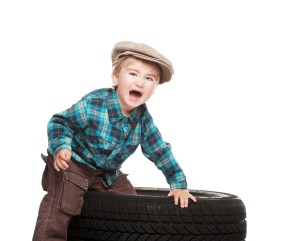
There is magnetism with a 2 1/2- to 3-year-old and their ability to blurt out observations in public. These comments can make us understand, that, yes, we are paying for our raising.
One teaching principle that I’ve found helpful to alleviate mortifying moments is the idea of indirect preparation. If you know it’s coming, prepare. Think of it as parent disaster preparedness.
If you live with a 3-year-old, be ready for him or her to make unsolicited comments about strangers or friends concerning size, color, shape, disability, clothes, age and hygiene. The list goes on.
Instead of wishing that the ground would open and swallow you, be prepared.
Your 3-year-old is in a natural and normal stage of development for observing the world and learning to connect language to new people, places and things.
Having some short talks about how people are different is one indirect preparation you can give. The book People by Peter Spier was on my classroom shelves, as well as at home. People does a wonderful job of depicting human diversity. Using this book with your child allows your child to ask questions in the privacy of your home and to begin to prepare for the variety of people he will encounter in the larger world.
With this book your child may ask questions like: Why is that man so fat? Why does that woman have pictures on her skin? Why does that person have no teeth? No clothes? Look wrinkly? Have no legs? Dirty clothes?
Which leads us to the second indirect preparation: Help your child learn about how and when to ask questions in private. Explain to your child that he or she can ask any question or talk about anything at home in private, but when we go out to the store, to church, to the movies, to a restaurant or for a walk, we need be careful about what we say because we don’t want to hurt people with our words.
Explain that when we are away from home (in public), we might see people or things we’ve never seen before and want to ask a question or say something. Tell your child something like this: ”We need to stop and think: Do I need to say this in private?”
”If you need to ask a question in private, you may ask us, ‘Mommy or Daddy, may I ask you a question in private?’ Then you can whisper the question in my ear. I might have to say, ‘You need to wait until we get home, please,’ if it’s not a good time to answer you in public. That’s good manners.”
You can practice at home with some ”what if” situations. ”What if we were at the store, and we saw someone in a wheelchair. What would you say?”
A third preparation is to prepare yourself and know how to handle the inevitable embarrassing situation.
First, have an instant response for your child. To ”Why does that lady have big red lips?” you might say, ”Remember how we talked about how people come in all shapes and sizes?”
Second, know what you are going to say to the victim of your child’s remarks. ”Excuse me, my child is at a stage where he notices that people aren’t all the same. He didn’t mean to be unkind, just curious. I’m sorry.”
Third, when you’re at home, review the incident with your child. ”Remember when we saw the lady with the red lips and you asked, Why does that lady have big red lips?’ That was a private question, and you need to stop and think if your question needs to be asked in private. Remember, you can ask me any question. But sometimes it needs to be done in private, so we don’t hurt people’s feelings. That’s good manners.”
Be prepared. Your child will make observations and comments because he or she is curious and literal.
Don’t make your child apologize for any remarks or scold them. You want to keep the lines of communication open. They will someday be teenagers. Be the adult in charge, and handle the inevitable ”situation,” protecting your child’s feelings as well as apologizing to the affected person, because kids will continue to say the darnedest things.
